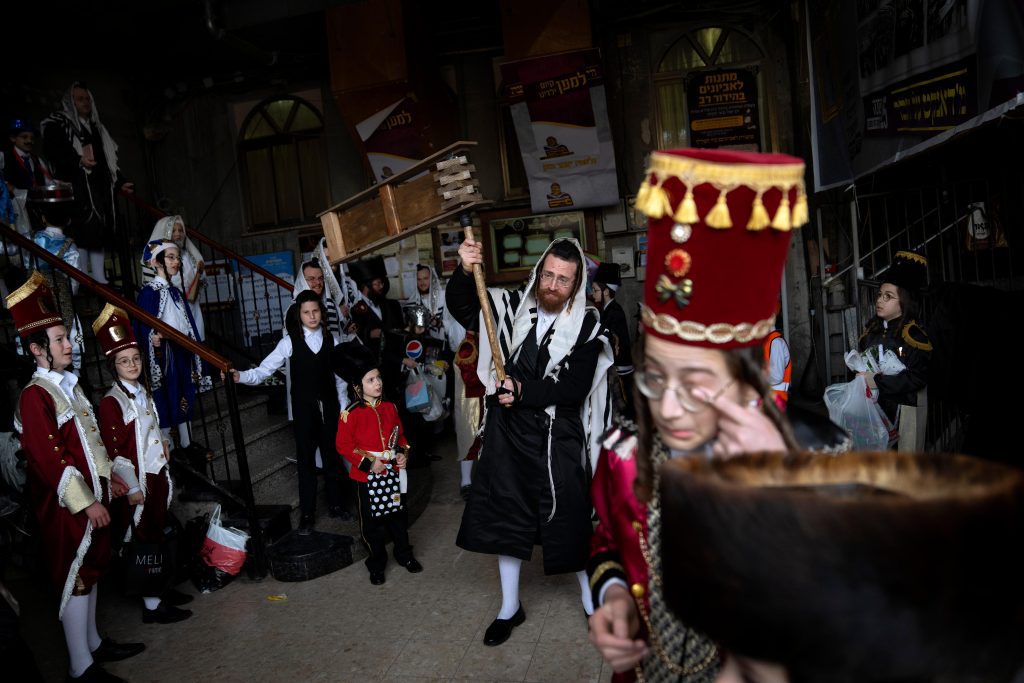By DAVID CRARY (Associated Press)
Purim It is widely seen as the most joyful of Jewish holidays, with celebrations featuring costumes, skits, noisemakers, and various levels of rowdiness.
This holiday commemorates the biblical story of how a plot to exterminate Jews in Persia was foiled, symbolizing Jewish survival throughout history. This year, its significance is heightened by the ongoing Israel-Hamas conflict. war in Gaza The war was triggered by the Oct. 7 attacks on Israel by Hamas, resulting in 1,200 deaths and about 250 hostages taken. The United States, Canada, and the European Union have designated Hamas as a terrorist organization.
WHEN IS PURIM?
Purim falls on the 14th day of the Hebrew month of Adar, beginning on Saturday night and continuing through Sunday. In most of Jerusalem, the holiday is celebrated one day later, from Sunday evening until Monday.
WHAT’S THE STORY THAT INSPIRED PURIM?
According to the Union for Reform Judaism, Purim celebrates the biblical account of Queen Esther and her cousin Mordechai thwarting a plot by the king’s adviser, Haman, to exterminate the Jews of Persia. The public reading of the Book of Esther in synagogues is a joyous and rowdy affair, marked by booing and noisemaking when Haman’s name is mentioned.
Over time, Haman has become a symbol of all anti-Semites in lands where Jews faced oppression. The significance of Purim lies not only in its origin, but also in its joyful celebration of Jewish survival.
WHAT’S UP WITH COSTUMES THIS YEAR?
In light of the war with Hamas, Israel’s Education Ministry cautioned students against wearing costumes that may induce fear, panic, or harm. This includes costumes portraying Yahya Sinwar, the leader of Hamas in Gaza.
Leading up to the holiday, Israeli police have confiscated numerous realistic toy guns and grenades as part of 'Operation Dangerous Toys.'
In response to the war in Gaza, many cities in Israel have called off traditional Purim parades.
SOMETIMES A DARK SIDE TO THE HOLIDAY
Similar to holidays of other religions, Purim has at times been associated with high-profile acts of violence.
On Purim in 1994, Baruch Goldstein, an American Israeli settler, tragically killed 29 Palestinian Muslims at the Cave of the Patriarchs in Hebron.
Two years later, in the nine days leading up to Purim, about 60 people died in a series of bombings attributed to Palestinian militants. On the eve of Purim, a suicide bombing outside a Tel Aviv shopping mall claimed the lives of 13 Israelis, including five children in Purim costumes.
WHAT ARE RABBIS SAYING BEFORE PURIM?
This year, rabbis have expressed different opinions about Purim.
For example, Yitzhak Yosef, the chief Sephardic rabbi in Israel, called for the defeat of Hamas when giving instructions to Israeli soldiers in Gaza on how to celebrate Purim.
He said, “Let us hope that God will destroy and eliminate Hamas quickly.”
Two New York City rabbis took a different approach, reflecting on the over 30,000 Palestinian casualties in the Israel-Hamas conflict in a recent opinion piece in The Forward, an online news source for the American Jewish community.
In their piece, Rabbis Amichai Lau-Lavie and Rachel Timoner urged for a more solemn observance of Purim, focusing on the implications of seeking revenge and the moral responsibility of wielding power.
The rabbis suggested observing Purim this year by making charitable donations to organizations that support the humanitarian needs of Israelis and Gazans.
Associated Press religion coverage is backed by the AP's collaboration with The Conversation US, supported by funding from Lilly Endowment Inc. The AP is responsible for this content.
collaboration
Purim is often portrayed as the most joyful Jewish holiday, characterized by celebrations involving costumes, performances, and noise makers. collaboration with The Conversation US, with funding from Lilly Endowment Inc. The AP is solely responsible for this content.









